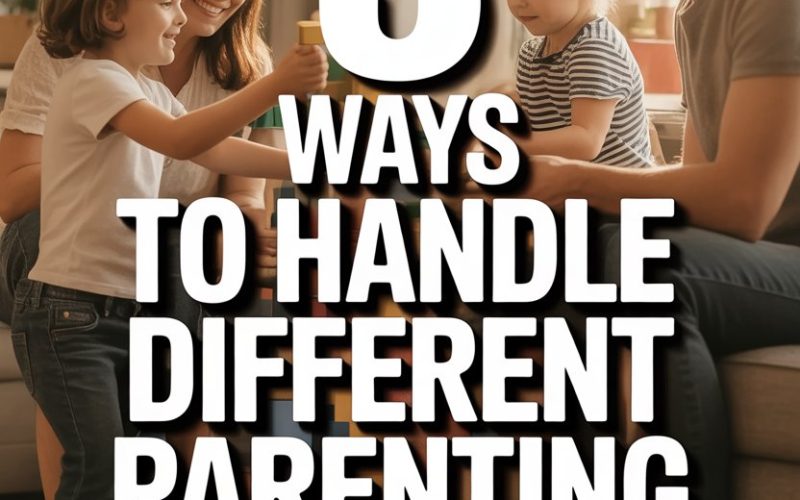No one tells you, when you’re holding that impossibly tiny newborn, that raising a child also means learning how to parent with another grown human—one who might be just as baffled about the rules as you are.
Suddenly, your soulmate is the person who genuinely believes kids should eat kale with every meal, while you’re just aiming for something vaguely green once a week. Welcome to the world of mixed parenting styles.
If you’ve ever felt like you and your partner are reading from entirely different parenting manuals (or, more likely, improvising wildly), you’re far from alone.
Here are three research-backed, real-life-tested ways to handle different parenting styles.
1. Recognize the Origins of Your Parenting Style
Ever found yourself sounding exactly like your mum, mid-tantrum?
Don’t worry: you’re not being possessed, you’re just human. Our parenting instincts are shaped by our childhoods, culture, and those late-night “how not to ruin your child” Google searches.
It’s easy to assume your way is the way. But a 2019 study from the University of California found that parents’ approaches are strongly influenced by their own upbringings.
If your partner seems to view bedtimes as a gentle suggestion rather than a hard rule, chances are, they survived a similar regime themselves.
Bringing these origins into the light is a game changer. Instead of arguing over whether screen time counts as a reward or a human right, try swapping family tales.
Ask each other what you loved—and hated—about your own childhood routines.
Don’t stop with the nostalgia tour. Get specific about the goals you each have for your children. Is it kindness? Independence? The ability to survive a family road trip without anyone threatening to walk home?
Once you’ve got clarity, you’ll understand what’s really behind each hot-button issue.
No, this isn’t a magic spell that will make your partner suddenly see the genius of your sticker chart system. But understanding is the first step in moving from “You’re doing it wrong!” to “Interesting that you do it that way. Tell me more.”
2. Pick Your Battles—Then Back Each Other Up
Imagine a world where every parenting clash is resolved by thoughtful discussion, mutual understanding, and a cup of tea. Now snap back to reality and accept that sometimes, you’ll disagree—and that’s normal.
The trick is knowing which hills are worth dying on.
Spoiler: not every sock-related skirmish deserves a family summit. Focus energy on the issues that truly matter to you—those that line up with your values and your child’s well-being.
Research from The Gottman Institute shows that children thrive when parents present a united front, even when approaches differ behind closed doors.
Consistency matters. If one parent says “yes” to dessert and the other says “no” at the same time, kids become very clever boundary negotiators—think pint-sized lawyers with jam on their faces.
Behind the scenes, agree which issues are “must-have” and which are “nice-to-have.” Maybe bedtime routines are non-negotiable for you, but your partner cares more about table manners.
Swap a little flexibility; you’ll both survive.
When you do disagree (and you will), avoid arguing in front of the kids. Hearing parents bicker over rules can be confusing—and sometimes rather entertaining, but not in a good way.
If you accidentally slip into a public debate over broccoli quotas, repair things later. A simple, “Mum and Dad had different ideas, but we sorted it out together,” is powerful.
It teaches children that conflict is part of relationships, and it’s possible to resolve clashes without resorting to dramatic sighing or interpretive eye rolls.
3. Create Your Own Playbook—Not Just Compromise, Collaborate
Mixing parenting styles isn’t about watering down each approach until you both end up as beige as a cafeteria sandwich. Collaboration means taking the best bits of both philosophies and building something uniquely yours.
Try a regular “state of the union” catch-up—five minutes after the kids are asleep, not when one of you is still picking Lego out of the carpet. Use this time to check what’s working, what’s flopping, and what you want to tweak.
Yes, it might feel like a work meeting, but—with fewer PowerPoint slides and more giggling over toddler quotes.
One handy trick: split the big topics.
If you’re a stickler for screen-time rules, take charge of tech boundaries. If your partner is passionate about healthy eating, let them lead dinner planning (with your veto power if beetroot appears more than once a month).
You might be surprised by the power of laughter here. According to research on family resilience, humor helps families weather even heated disagreements.
Sometimes, the best solution when confronted with yet another sock-on-the-lampshade crisis is to laugh, shrug, and agree you’re both making it up as you go along. Because you are—and that’s okay.
Don’t forget to call in the experts when needed. Family counsellors, parenting workshops, or even that wise friend who somehow raised three well-adjusted kids (and still smiles at you in the supermarket) can offer perspectives you haven’t thought of.
The point isn’t to find the One True Way, but to cobble together what works for your unique family.
Happily Ever After…ish
Perfectly aligned parenting styles? Not happening.
But that’s good news—your children benefit from seeing different approaches, learning flexibility, and watching grown-ups negotiate, compromise, and recover from the odd foot-in-mouth moment.
The real secret isn’t never disagreeing, but learning how to disagree well.
When you and your partner show respect, flexibility, and the occasional willingness to laugh at your own contradictions, you’re modelling the kind of resilience your kids will need in a world full of different opinions and personalities.
One day, your child will tell a therapist (or, if you’re lucky, a friend) about their mum who could never say no to bedtime stories and their dad who coached them through every maths problem with the patience of a saint.
If you’ve listened, compromised, and backed each other up—even through sock wars and broccoli stand-offs—you’ve given your child something far more valuable than a single “right” way to parent.
And really, who needs a perfect playbook when you’ve got a good sense of humour, a shared goal, and the number for pizza delivery on speed dial?




